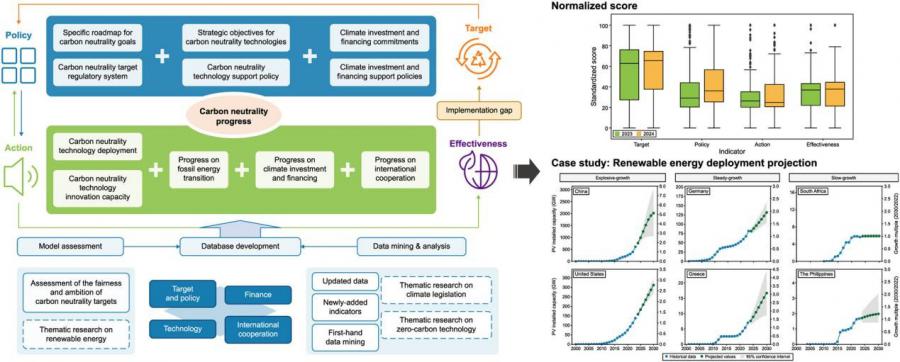
From pledges to action: the global struggle for carbon neutrality
FAYETTEVILLE, GA, UNITED STATES, April 2, 2025 /EINPresswire.com/ -- The global race toward carbon neutrality has gained momentum, yet the gap between promises and execution remains stark. A groundbreaking study assessing 197 countries finds that while 151 nations have pledged carbon neutrality, only 72 have implemented comprehensive policy frameworks. At the current pace, global renewable energy capacity will only reach 2.7 times its 2022 level by 2030—falling short of below the tripling target. This shortfall underscores the urgent need for stronger international cooperation, increased investment, and accelerated technology diffusion to bridge the implementation gap.
Addressing climate change has become a defining global challenge, with the Paris Agreement urging nations to limit temperature rise well below 2°C. By 2024, 151 countries had pledged carbon neutrality, and all 198 parties to the UN Framework Convention on Climate Change had adopted climate laws. Yet, disparities in economic resources, technological capabilities, and policy execution remain major roadblocks. Renewable energy adoption lags behind targets, while climate finance and global collaboration remain insufficient. Against this backdrop, a comprehensive assessment of carbon neutrality efforts is critical to identifying shortcomings and accelerating progress.
Published (DOI: 10.1016/j.ese.2025.100546) in Environmental Science and Ecotechnology on March 3, 2025, a pioneering study led by Tsinghua University researchers provides a detailed evaluation of global carbon neutrality progress. The study assesses 197 countries across four key dimensions—targets, policies, actions, and effectiveness—revealing that while commitments are widespread, implementation is highly uneven. Significant gaps in policy execution and technological adoption continue to hinder progress toward carbon neutrality.
The study reports that 151 countries have pledged carbon neutrality, with 120 incorporating these commitments into legal frameworks. However, only 72 nations have developed comprehensive policies to drive tangible action. Renewable energy deployment remains a major concern, with projections showing that global capacity will only expand to 2.7 times its 2022 level by 2030—below the tripling goal. The study also highlights stark regional disparities: while China, the United States, and the European Union lead in renewable energy expansion, many developing nations struggle due to inadequate financial and technological support. These findings underscore the urgent need for stronger international collaboration, increased investment, and fewer barriers to technology diffusion to close the implementation gap.
"While global commitments to carbon neutrality are growing, the real challenge lies in turning these pledges into actionable policies and measurable progress," says Prof. Wenjia Cai, a lead author of the study. "Our findings highlight the urgent need for deeper international cooperation and increased financial support, particularly for developing countries, to ensure that ambitious carbon neutrality targets translate into real-world outcomes."
The study’s findings have far-reaching implications for global climate policy. It calls for stronger efforts in transparency, financing, and international collaboration to accelerate the transition to carbon neutrality. Developing nations, in particular, require substantial support to overcome financial and technological barriers. The research also stresses the need for customized strategies tailored to each country's unique resource availability and development stage. By addressing these challenges, the global community can move closer to achieving carbon neutrality and mitigating the effects of climate change.
DOI
10.1016/j.ese.2025.100546
Original Source URL
https://doi.org/10.1016/j.ese.2025.100546
Funding information
This work was supported by the National Natural Science Foundation of China (No. 72140002, 72348001 and 72204137).
Lucy Wang
BioDesign Research
email us here
Distribution channels: Environment, Science
Legal Disclaimer:
EIN Presswire provides this news content "as is" without warranty of any kind. We do not accept any responsibility or liability for the accuracy, content, images, videos, licenses, completeness, legality, or reliability of the information contained in this article. If you have any complaints or copyright issues related to this article, kindly contact the author above.
Submit your press release
